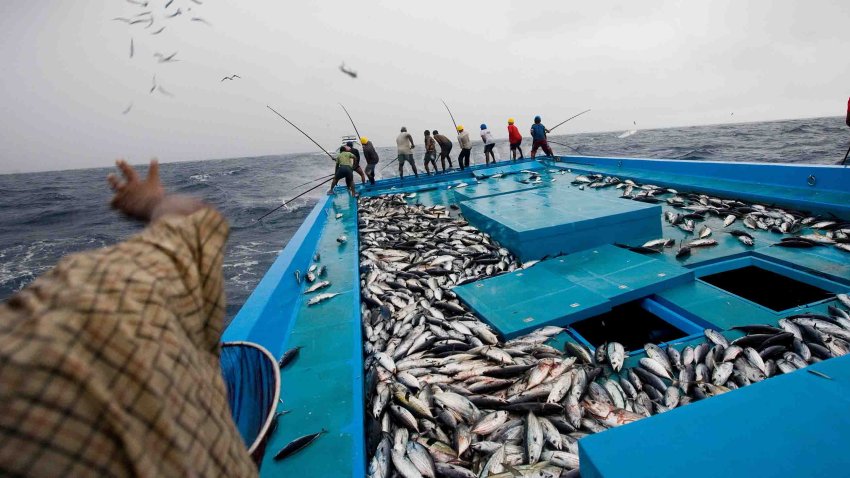
The Indonesian government hosted the fifth Our Ocean Conference in Bali on October 29 and 30. It was the latest in a string of oceans-focused summits — with more on the way, such as the The Economist’s World Ocean Summits and the Sustainable Oceans Summits organised by the industry-coalition the World Ocean Council.
These meetings typically bring together different actors including heads of state, transnational environmental NGOs, corporations from a broad array of ocean industries, and so-called “impact investors” to discuss how best to ensure a supposed “sustainable” and “win-win-win” use of coastal and marine resources.
Notably absent from all these meetings are representatives of the millions of small-scale fisher peoples who rely on coastal and marine ecosystems for their livelihoods.
As small-scale fisher peoples are left out of these multi-stakeholder gatherings, so too are they being physically squeezed out of ocean-spaces.
This is a result of an increasing interest in changing the use and control of ocean-space through a “blue fix” cocktail ostensibly aimed at protecting the oceans.
Glaring contradictions
The envisioned win-win-win covers ecological, social and economic fronts. In practice, however, the contradictions are glaring.
First, in tune with the more general turn towards conservation based on a model of “selling nature to save it”, the “blue fix” discourse aims to attract private investment for protected marine areas and so-called sustainable tourism.
It seems to be less about challenging what is driving the destruction of marine and coastal ecosystems — namely the many different ocean industries — and more about turning conservation into a profitable venture, while accommodating destructive uses of ocean-space.
Second, it seeks to satisfy growing global demand for healthy food and nutrition through expanding capital-intensive large-scale aquaculture, while brushing off the negative socio-ecological impacts. In the past 30 years, aquaculture production has exploded, outpacing the growth of capture fisheries at an average rate of 8.6% per year.
Aquaculture is now responsible for almost half of the fish we eat. This growing sector has provided a steady protein supply over the past three decades, but it relies on vast energy inputs and increasing volumes of capture fish, soy, rapeseed, sunflower and wheat for feed.
Furthermore, it creates a series of social and ecological problems along the way.
For example, Turkish regulatory changes encouraged concentration within the sector by rejecting applications for marine aquaculture investments of less than 250 tons. This, coupled with the large amount of capital needed to enter a quickly intensifying sector, led to the direct or indirect elimination of small-scale fish farms by “growing companies and growing farms”.
Aquaculture in Turkey shifted from production volumes of 1500 fish per farm in 4 cubic metre wooden cages in the 1990s to one million fish per farm housed in circular cages of 50 metres in diameter. In short, the rapid growth in aquaculture has squeezed out small-scale production.
And finally, despite much talk about the opportunities in offshore wind and other “renewable” energy sources in the blue economy, in actual numbers oil and gas remains the key energy source. Hence the focus remains on the upholding and expansion of the fossil fuel seascape.
Simultaneously, the whole idea of oceans being the source of “renewable” obfuscates the raw materials needed to sustain these “renewables” — including rare-earth minerals, of which the seabed is increasingly seen as a supplier.
For example, in Kiribati, the island nation whose prime minister is renowned for putting the consequences of sea level rise for Pacific Island states firmly on the international agenda, concessions for deep sea mining, mainly to source the key elements for wind turbines and photovoltaic batteries, is framed as part of the new clean energy-based blue economy.
The environmental and ecological costs of such extraction are yet to be fully determined.
'Blue growth' illusion
The “blue fix” promoted by this slew of Ocean or “Blue” conferences is merely an attempt at accommodating the interests of capital in expanding accumulation opportunities through existing and new ocean industries. At the same time, it aims to simultaneously maintain some form of social legitimacy by promising that these new uses do not undermine sustainability, because they are combined with conservation.
Dressing up these destructive practices in “blue” language doesn’t change the nature of their material socio-ecological impacts for people and the planet. If we really want to move towards a more sustainable use of coastal and marine resources, we have to fundamentally challenge the expansion of many, if not all, of these ocean industries currently shacking up with transnational environmental NGOs — while pushing out former users of these ocean-spaces, notably small-scale fisher peoples.
Tragically, small-scale fisher peoples are, in most cases, the only actors that can truly be said to be using these ocean-spaces in a sustainable manner — and can provide the template for how to do so. Perhaps, all the suits who met in Bali should take their cue from the small-scale fisher peoples who gathered in Jakarta for their own parallel meeting on their vision for the ocean.
[The authors are researchers from the Transnational Institute, an international advocacy group committed to building a just, democratic and sustainable planet.]